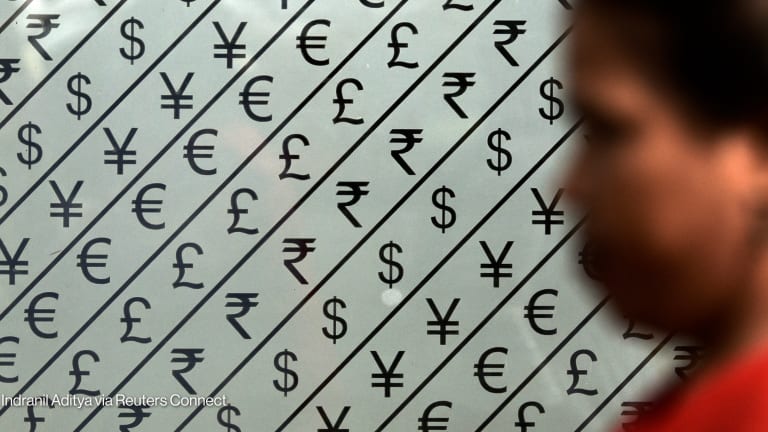Interactive: The World Bank's contract awards for environmental work
Devex digs through thousands of awards to find out how much, where, and with whom the World Bank contracts for conservation- and environment-related work.
The World Bank is one of the world’s largest financial institutions providing development assistance, with major contract awards totaling over $10 billion in 2019. But what about its funding for conservation and environmental sustainability? The bank has a mixed past in terms of environmental protection. Its Environment Strategy 2012-2022 focuses on green, clean, resilient pathways for development. And in its strategy adopted in 2013, the bank included “Environment and Natural Resources” as one of the “Global Practices” underpinning its approach to development. On the other hand, the bank put up $21 billion for fossil fuel projects between 2014 and 2018, according to one report, and has been criticized for the environmental impact of its investments. In a recent panel discussion hosted by the Brookings Institution, Stéphane Hallegatte, lead economist for the bank’s climate change group, highlighted the importance of managing the current crisis and economic stimuli in a way that is compatible with a healthy climate and environment. The World Bank’s major awards are classified into sectors, although the accuracy of sector-tagging is a problem across development funders and the bank does not make all its contract awards public. This analysis is based on published awards tagged as targeting the environment, including environmental studies. In addition, awards that had no major sector assigned to them but appeared to be environment-focused, based on their title and description, were included here. This analysis provides an overview of suppliers, locations, and procurement for the bank’s environmental work and may be useful for advocacy officers and business developers. Keep reading to explore the data with an interactive visualization. A diverse ecosystem of suppliers In total, there are over 18,000 major awards for 2016 to 2020 from the World Bank. Of these, only around 300 were identified as environment-related under this analysis, with combined worth of just under $222.3 million. Almost 90% of the environment awards are classified as consulting services. However, they make up only 35% of the total value. According to the data available, the average budget of an environmental consultancy is $337,142. The rest of the funding goes to civil works, goods, and nonconsulting services. Devex identified around 150 supplier organizations or contractors for the World Bank’s major environment-related awards for 2016-2020 period. Of these, around 40% were individual consultants. No organization won more than three awards over this period, which demonstrates a widely dispersed ecosystem of suppliers receiving environment contracts. The Food and Agriculture Organization received the most funding with $13 million split across three different awards, which constituted 6% of the World Bank’s environment funding for the period. In second place is Otts Constructors Company, a Samoan engineering company, at $12 million. Next is COARCO SA, an Argentinian construction company, with just under $12 million. Of the top 10 supplier organizations by funding amount, two are United Nations agencies, two are Vietnamese organizations, and the others are based in France, the Netherlands, Samoa, China, Nigeria, and Argentina. Geographical distribution of environment contracts The environment-related awards cover about 70 recipient countries and regions. Most had fewer than five major contract awards over this time period. By number of awards, the top borrower locations — countries and regions that received financing from the bank — are Mozambique at 20, the Democratic Republic of the Congo at 15, and West Africa at 12. Mozambique is also the top supplier country by number of awards — with 12 — meaning only eight were implemented by foreign organizations. In 2019, the World Bank signed landmark agreements with Mozambique and the Democratic Republic of the Congo to reduce greenhouse gases. Funding to small island developing states, or SIDS, accounted for almost 10% of the contract awards. These are some of the countries most vulnerable to the effects of climate change yet are also some of the least responsible for greenhouse gas emissions. The main development focus for many of these nations is on building resilience, especially to natural disasters. In total, there were contract awards for 12 countries classified as SIDS. However, a large proportion went to three countries. Almost half of the funding went to Samoa, followed by 30% to Haiti and about 15% to the Maldives. Explore the data on World Bank contract awards for environment-related work with this interactive visualization. <div class='tableauPlaceholder' id='viz1591152207763' style='position: relative'><noscript><a href='#'><img alt=' ' src='https://public.tableau.com/static/images/Wo/WoldBankContractAwardsforEnvironment2016to2020/Dashboardsummary/1_rss.png' style='border: none' /></a></noscript><object class='tableauViz' style='display:none;'><param name='host_url' value='https%3A%2F%2Fpublic.tableau.com%2F' /> <param name='embed_code_version' value='3' /> <param name='site_root' value='' /><param name='name' value='WoldBankContractAwardsforEnvironment2016to2020/Dashboardsummary' /><param name='tabs' value='no' /><param name='toolbar' value='yes' /><param name='static_image' value='https://public.tableau.com/static/images/Wo/WoldBankContractAwardsforEnvironment2016to2020/Dashboardsummary/1.png' /> <param name='animate_transition' value='yes' /><param name='display_static_image' value='yes' /><param name='display_spinner' value='yes' /><param name='display_overlay' value='yes' /><param name='display_count' value='yes' /><param name='filter' value='publish=yes' /></object></div> <script type='text/javascript'> var divElement = document.getElementById('viz1591152207763'); var vizElement = divElement.getElementsByTagName('object')[0]; if ( divElement.offsetWidth > 800 ) { vizElement.style.width='600px';vizElement.style.height='1227px';} else if ( divElement.offsetWidth > 500 ) { vizElement.style.width='600px';vizElement.style.height='1227px';} else { vizElement.style.width='100%';vizElement.style.height='2027px';} var scriptElement = document.createElement('script'); scriptElement.src = 'https://public.tableau.com/javascripts/api/viz_v1.js'; vizElement.parentNode.insertBefore(scriptElement, vizElement); </script> For access to in-depth analysis, insights, and funding opportunities from over 850+ sources — combined with Devex Pro news content — sign up to a Pro Funding subscription online today or get in touch to learn about our Pro Funding group options.
The World Bank is one of the world’s largest financial institutions providing development assistance, with major contract awards totaling over $10 billion in 2019. But what about its funding for conservation and environmental sustainability?
The bank has a mixed past in terms of environmental protection. Its Environment Strategy 2012-2022 focuses on green, clean, resilient pathways for development. And in its strategy adopted in 2013, the bank included “Environment and Natural Resources” as one of the “Global Practices” underpinning its approach to development.
On the other hand, the bank put up $21 billion for fossil fuel projects between 2014 and 2018, according to one report, and has been criticized for the environmental impact of its investments.
This story is forDevex Promembers
Unlock this story now with a 15-day free trial of Devex Pro.
With a Devex Pro subscription you'll get access to deeper analysis and exclusive insights from our reporters and analysts.
Start my free trialRequest a group subscription Printing articles to share with others is a breach of our terms and conditions and copyright policy. Please use the sharing options on the left side of the article. Devex Pro members may share up to 10 articles per month using the Pro share tool ( ).
Janadale Leene Coralde works as a contributing analyst for Devex. Based in Manila she reports on development donors activities and designs funding data visualisations. She has a degree in political economy, specializing in international relations and development, and has previously worked as a researcher for Chemonics, the REID foundation, and the Philippines House of Representatives.
Emma Stibi works with the Devex Analytics team based in Copenhagen, where she assists in curation, analysis, and dissemination of development data. She is currently finishing her bachelor’s degree in development studies at Lund University and has also studied in the U.S. and Korea. Her interests include gender equality and disaster risk management.









